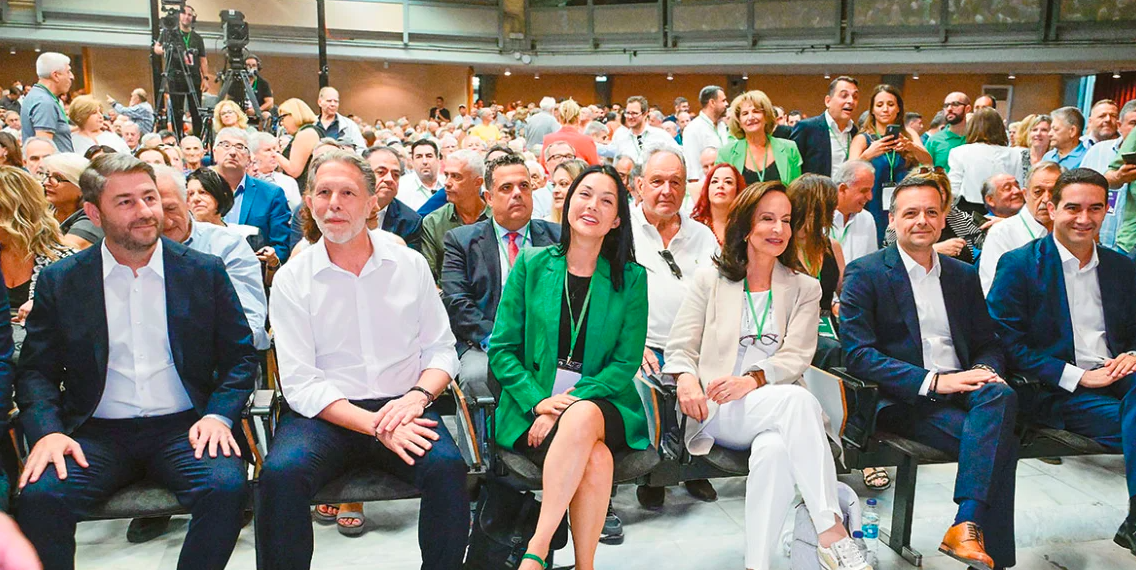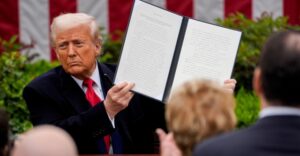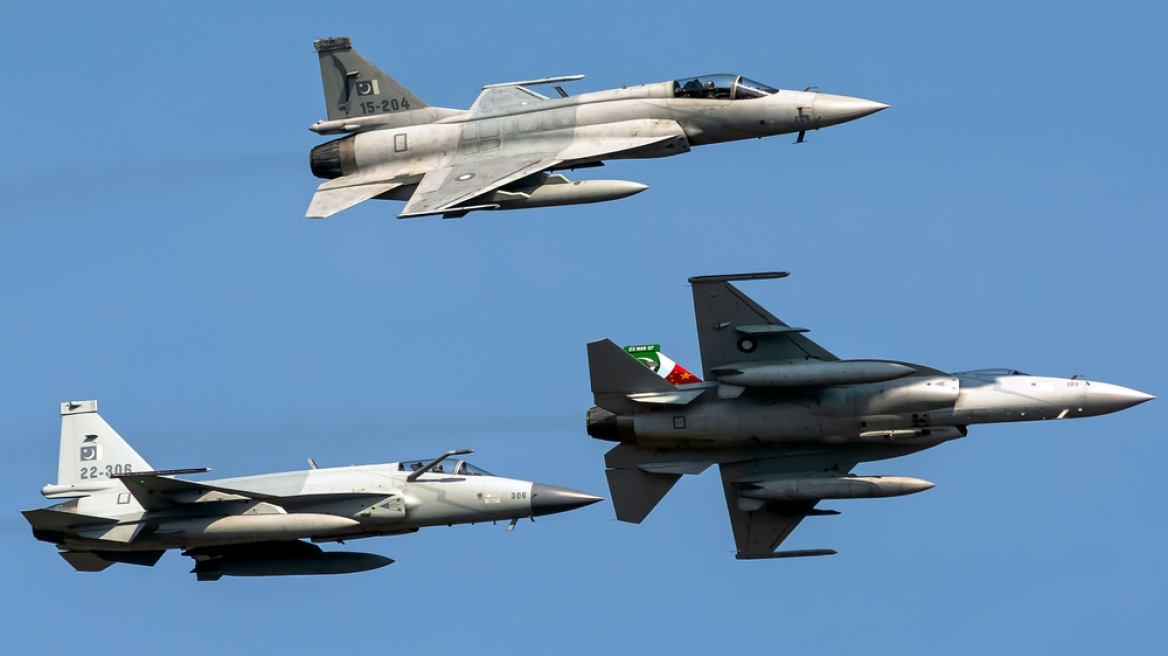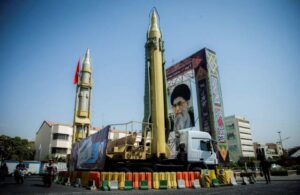The battle for the leadership of PASOK between its candidates is intensifying as they prepare for tonight’s debate (21:00, ERTNEWS). The final two weeks before the internal party elections have seen a tactical and composed race so far, with candidates avoiding confrontations or major missteps. The contenders have exchanged a few “poisonous remarks” at times, such as in the recent Central Committee meeting, but none have gone as far as openly accusing one another.
Polls suggest that this careful approach has worked in PASOK’s favor, as the party continues to climb in voter intention surveys, regaining ground after a disappointing performance in the European elections. The party is currently targeting the second spot in the political landscape, with recent polls placing its support at around 15.5% to 16%, an increase of roughly three points compared to the European elections.
Signs of Encouragement for PASOK
Party insiders observing the electoral race have pointed to several promising signs. First, the decline in New Democracy’s polling numbers, might hinder the party’s ability to achieve a strong majority in the next national elections. Second, the ongoing internal struggles of SYRIZA, which faces low single-digit poll ratings and the threat of further splits. Lastly, PASOK’s opportunity, as highlighted by former Prime Minister Kostas Simitis, is not unlimited, urging a careful and strategic approach.
Those who advocated for early elections right after the European vote feel vindicated, especially given PASOK’s improved performance in polls. The campaign between the six candidates has so far maintained a united front, benefiting the party overall. However, tensions are expected to rise as the final showdown approaches on October 6 and 13.
The Forecasts and Strategic Moves
Predictions are running high, with candidates’ teams pressuring MPs and party officials to declare their support publicly. While this is a typical pre-election dynamic, the tone in PASOK remains largely civil and coordinated. A senior party official even quipped, “It would take a lot for us to turn into SYRIZA,” though some believe tensions could flare in the second round if the race becomes particularly tight.
A recent poll by MRB, shown on OPEN TV, suggests a neck-and-neck contest in the second round, especially if Nikos Androulakis faces off against Haris Doukas. The poll forecasts Androulakis winning 44.6% to Doukas’ 44.1%. However, if the second-round contenders are Androulakis and Pavlos Geroulanos, Androulakis would likely secure 54.5%, while Geroulanos would capture 37%. Predictions show similar outcomes against other candidates like Anna Diamantopoulou.
Pollsters and campaign experts agree that the outcome may depend on the turnout, particularly if voters from outside PASOK, disillusioned with SYRIZA or New Democracy, decide to vote. Already, Haris Doukas’ events have attracted participants from the broader center-left spectrum, and Diamantopoulou has drawn support from former party members and even figures from the center-right.
The Debate and Strategy
Tonight’s debate will be the first and last before the first voting round, drawing significant attention from both campaigns and voters. Candidates are preparing meticulously, sticking to strict guidelines to avoid falling into traps. Representatives from each candidate have negotiated every detail, ensuring that the debate, hosted by journalists Giorgos Kouvaras and Apostolos Maggiriadis, will allow for a lively but structured discussion.
Candidates will sit at two curved tables, arranged alphabetically. Nikos Androulakis, Pavlos Geroulanos, and Nadia Giannakopoulou will be seated at one table, while Anna Diamantopoulou, Haris Doukas, and Michalis Katrinis will sit at the other.
Unlike previous debates, this one promises more open exchanges, allowing viewers to get a better sense of the candidates’ positions early on. The debate will cover six main topics, with candidates required to stay within the time limits set for each response.
Debate Topics:
- Economy and Development
- Social Welfare, Youth, and Demographics
- Foreign Policy, Defense, and the EU
- Governance, Institutions, and Local Government
- Climate Crisis, Civil Protection, and Energy Transition
- PASOK: The Future
Each journalist question will last 30 seconds, while candidates will have 90 seconds to respond. Follow-up questions and answers will have shorter time limits. Candidates will also have the opportunity to ask each other questions five times throughout the debate.
Androulakis’ Game Plan
Nikos Androulakis, returning from his weekend campaign tour in Trikala and Larissa, has been intensifying his debate preparations with his core team, including Communications Director Stefania Mourelaou and campaign spokesperson Thanasis Glavinas. Androulakis aims to position himself as the candidate best suited to lead a strong opposition against New Democracy, emphasizing his role in securing PASOK’s current standing in the polls.
Androulakis is expected to criticize certain party figures who, by pushing for leadership changes too early, created unnecessary internal conflict rather than focusing on challenging the ruling party.
The Doukas Approach
Haris Doukas is also preparing for possible attacks but intends to remain composed unless provoked. His team has focused on crafting a message of unity and bringing PASOK into a governmental trajectory. He is expected to highlight his clear differences from Diamantopoulou, particularly on policy issues.
Diamantopoulou’s Strategy
Anna Diamantopoulou will likely aim to position herself as a pragmatic leader, capable of challenging New Democracy while maintaining unity within PASOK. She plans to emphasize her experience both in Greece and in Europe, portraying herself as the only candidate capable of inspiring trust and confidence.
The Geroulanos, Katrinis, and Giannakopoulou Plans
Pavlos Geroulanos is expected to treat the debate as an opportunity to outline his vision for Greece’s future, focusing on his parliamentary work. Michalis Katrinis will attempt to present himself as the candidate with higher ambitions for PASOK, while Nadia Giannakopoulou will focus on clear positions on major issues, seeking to make a strong impression.
As PASOK heads into its final weeks of campaigning, tonight’s debate will be a crucial moment for candidates to make their case and for voters to assess who should lead the party forward.
Ask me anything
Explore related questions





